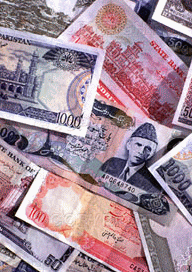
Pakistan’s rupee will weaken 4.2 percent to a record this year as debt payments rise and foreign investors shy away from the nation because of deteriorating security, according to Standard Chartered Plc.
Investment from overseas has dropped in the last three years after Pakistan’s military cracked down on Taliban militants along the border with Afghanistan, prompting the country to seek international aid to foot the bill. Imports increased 40 percent in March, the most since June 2008, raising demand for dollars and driving the rupee to an all-time low.
The currency will slump to 88 per dollar by Dec. 31, Sayem Ali, an economist at Standard Chartered, said yesterday in an interview from Karachi. That would put the rupee on course for a seventh annual loss. It traded at 84.28 as of 10:40 a.m. local time, little changed from the end of last year.
“The outlook is primarily determined by the further slowdown in overseas investment, large external debt payments of about $4.5 billion annually and a higher import bill,” Ali said.
Foreign investment declined 34 percent to $1.34 billion in the nine months to March from the start of the fiscal year in July 2009, according to the central bank’s website. The funds reached a record $8.45 billion in the year ended June 30, 2007. Pakistan had $53 billion of external debt as of March 31, or one third of its gross domestic product, official data show.
Foreign Reserves
The rupee fell 22 percent in 2008, the most since Bloomberg started tracking the currency in 1989, amid a power struggle between the then President Pervez Musharraf and politicians Asif Ali Zardari and Nawaz Sharif. Zardari became head of state in September 2008 elections.
Foreign-exchange reserves held by the State Bank of Pakistan dropped to $3.45 billion in the 12 months to October 2008, from $14 billion a year earlier. The nation received a $7.6 billion loan from the International Monetary Fund in 2008 to help avoid defaulting on debt. The package was increased to $11.3 billion last year. The holdings stood at $15 billion in the week ended 30 April, 2010.
Pakistan may seek more IMF assistance, Finance Adviser Abdul Hafeez Shaikh said May 12. The government also wants the 25 donor countries of the Friends of Democratic Pakistan, which includes the U.S. and U.K., to meet loan and aid commitments of as much as $5.3 billion as the country battles to contain terrorist insurgents. Prime Minister Yousuf Raza Gilani said the economy has lost $35 billion in the past nine years because of the fighting.
“The medium-term outlook on the rupee will depend heavily on aid inflows from donor nations, the IMF, the World Bank and the Asian Development Bank,” Ali said. Europe’s debt crisis “will have a negative impact as weak demand from the European Union will impact exports and foreign-exchange inflows into the economy,” he said.
No comments:
Post a Comment